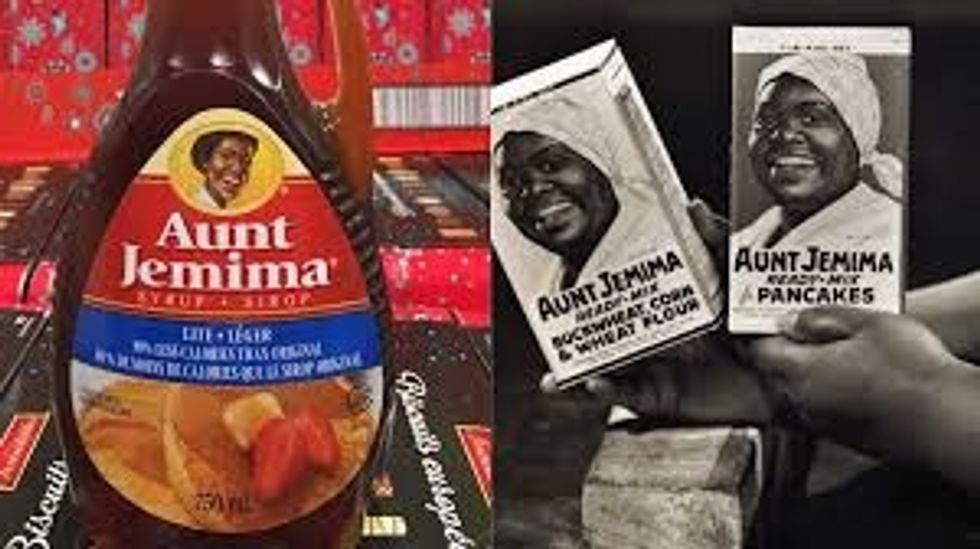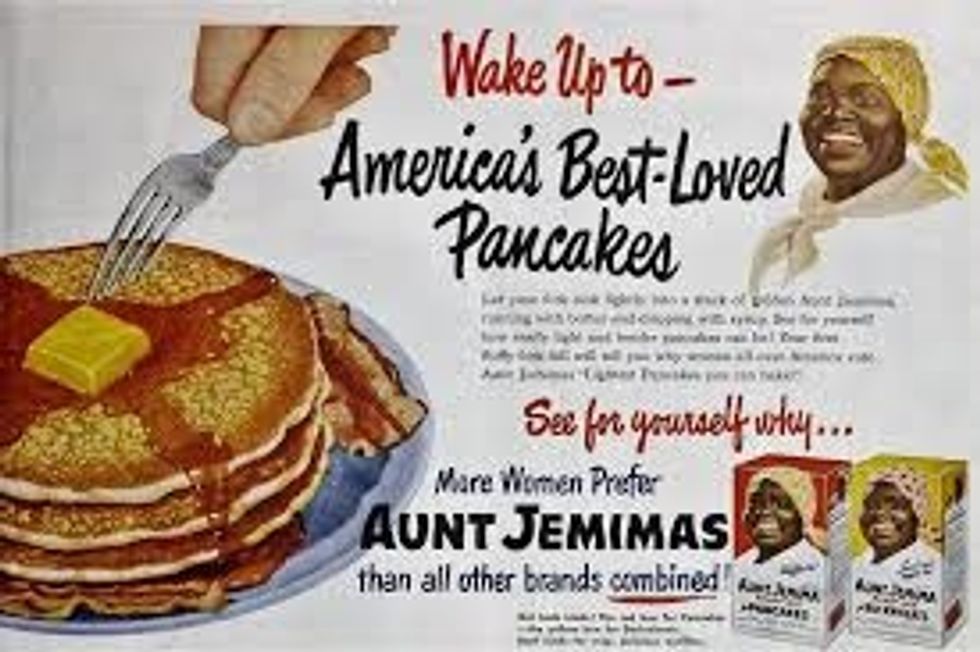
Aunt Jemima
After 130 years of business, the infamous breakfast brand Aunt Jemima is officially changing its name and logo.
Aunt Jemima’s Quaker Oats pancake boxes and syrup are popular staples in breakfast spreads everywhere. The brand has always featured the iconic image of Aunt Jemima as its logo.
According to the company’s website, Aunt Jemima is based on a woman named Nancy Green, a former slave who initially demonstrated the brand at the World’s Fair in 1893 in Chicago. Green was a “storyteller, cook, and missionary worker,” according to the Quaker website.
But Aunt Jemima has been the subject of critics for many decades, and finally the brand is backpedaling. “As we work to make progress toward racial equality through several initiatives, we also must take a hard look at our portfolio of brands and ensure they reflect our values and meet our consumers’ expectations,” the company told NBC.
“We recognize Aunt Jemima’s origins are based on a racial stereotype,” Kristin Kroepfl, the company’s vice president and chief marketing officer, said in a press release. “While work has been done over the years to update the brand in a manner intended to be appropriate and respectful, we realize those changes are not enough.”
The problem lies in the character Aunt Jemima, who originated during minstrel shows in the 1830s. White performers would masquerade as Black people, and Aunt Jemima was a popular archetype of these shows known as “mammy.”
“From slavery through the Jim Crow era, the mammy image served the political, social, and economic interests of mainstream white America,” reads the Jim Crow Museum’s website. “During slavery, the mammy caricature was posited as proof that blacks—in this case, black —were contented, even happy, as slaves. Her wide grin, hearty laugher, and loyal servitude were offered as evidence of the supposed humanity of the institution of slavery.”
“[The] Aunt Jemima logo was an outgrowth of Old South plantation nostalgia and romance grounded in an idea about the ‘mammy,’ a devoted and submissive servant who eagerly nurtured the children of her white master and mistress while neglecting her own,” writes Riché Richardson, a professor at the Africana Studies center at Cornell University, whose work underscores the pervasiveness of the plantation myth and racism’s embedded position in American consciousness. “Few moments have underscored the continuing influence of the plantation myth, and its impact on Confederate scripts of slavery, more profoundly than the nearly successful effort of the United Daughters of the Confederacy to erect a monument in honor of the ‘faithful slave mammies of the South’ in the nation’s capital in 1923. It is about time for there to be some honest conversation about what is at stake in continuing to market products even nowadays under names such as ‘Aunt Jemima.'”
As Sarah Doneghy writes on Black Excellence, “The Mammy was created by white Southerners to redeem the relationship between black women and white men within slave society.” Essentially, the archetype likely never existed in reality: It was, as so much is, crafted specifically for white America’s comfort and for the absolution of white guilt. The same could be said of the minstrel songs which inspired Aunt Jemima.
According to NPR, “‘Old Aunt Jemima’ originated as a song of field slaves that was later performed at minstrel shows.” (The New York Times’ 1619 podcast’s episode “The Birth of American Music,” offers a fascinating window into the way American minstrel bands often functioned as a way for white people to comfort themselves about the institution of slavery).

Prior to this week, the brand formerly known as Aunt Jemima has acknowledged the racist implications of its central figure but has never faced consequences of over a decade of criticism. Over the 20th century, the company attempted to change the look of the woman on the label, giving her a pearl necklace and changing her appearance, but that did nothing to remedy the image’s true nature, and protests continued to flare up.
In 1989, activists threw Quaker Oats into Lake Michigan and threatened to boycott the company, leading it to change its central image once again—yet still, the image depicted a Black woman in a position of subservience. In 2014, descendants of Anna Short Harrington—a previous Aunt Jemima model from the 1930s—sued Quaker for $3 billion using their ancestor’s image without paying royalties. They also said that the company had stolen Harrington’s recipes. The judge dismissed the case, and Aunt Jemima remained.
Even after all this, the current description on the company’s website still falls into the stereotype. “Aunt Jemima Pancakes stand for warmth, nourishment and trust – qualities you’ll find in loving moms from diverse backgrounds who want the very best for their families,” their website reads, a statement laden with stereotypes in itself.
“True to form, there is no mention of ingredients or taste. There’s no reference to food,” continues Doneghy regarding the description. “Nourishment is listed as a quality you’ll find in the person – in this case the Slave Mammy – who you can count on to feed you, care for you, and work hard for you. You are her only priority and your ease and comfort is all she needs to be fulfilled. That is what this company is selling.”

Finally—only in the wake of massive global protests against the killing of George Floyd—is the company making a change. For its part, Quaker plans to “continue the conversation by gathering diverse perspectives from both our organization and the Black community to further evolve the brand and make it one everyone can be proud to have in their pantry,” according to Kroepfl.
All their half-hearted attempts to reform and change Aunt Jemima could never be successful as long as the title remained. As we know: Change can’t happen within a broken system built off of oppression. Instead, broken systems must be defunded and abolished.
So, we’re celebrating the end of Aunt Jemima in 2020. For some, this change is far too little, too late, and it looks like one corporation’s effort to adjust its brand to the current moment’s social justice values. Certainly, it’s far from the tangible changes we actually need, and it means nothing to people whose lives are threatened by police, racist healthcare systems, and the like.
And others are angry that they’re losing their precious Aunt Jemima. But don’t worry, angry commenters. Just because you can’t have Aunt Jemima-brand syrup doesn’t mean you can’t enjoy your pancakes. This change will cost you nothing, personally, and it’s really only a tiny and pretty performative step in the right direction. Simply changing logos will mean nothing if actual steps towards change—like the reallocation of police budgets to education and community centers, or reparations—are not implemented.
TWO MINUTE HISTORY | AUNT JEMIMAwww.youtube.com














